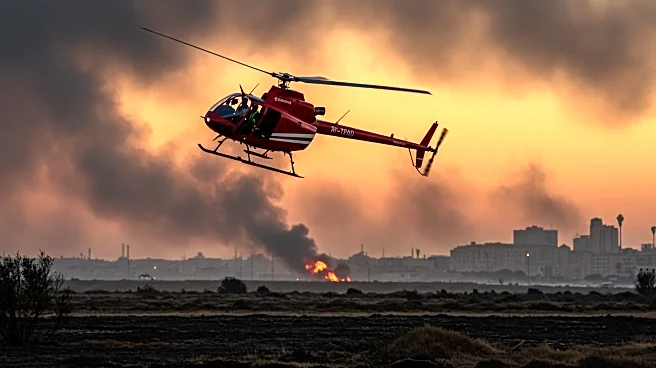What's Happening?
A severe heatwave across the Mediterranean region has led to deadly wildfires, claiming at least three lives and forcing thousands to evacuate. In Spain, a Romanian man died from burns while rescuing horses, and a child in Sardinia succumbed to heatstroke. Montenegro reported a soldier's death during firefighting efforts. The fires, fueled by high temperatures and strong winds, have devastated areas in Spain, Portugal, Greece, and Turkey, with significant damage to land and heritage sites. Authorities are on high alert, coordinating emergency responses as the situation remains critical.
Why It's Important?
The wildfires highlight the increasing impact of climate change, with scientists warning of more frequent and intense heatwaves. The destruction affects local economies, particularly tourism, and poses a threat to cultural heritage sites. Emergency services are stretched thin, and the risk of further fires remains high. The situation underscores the urgent need for climate action and improved disaster preparedness. Communities face significant losses, and the environmental damage could have long-term consequences for biodiversity and land use.
What's Next?
Authorities are bracing for continued high temperatures and strong winds, which could exacerbate the fires. Emergency services are mobilizing resources, including air support, to contain the blazes. Investigations into possible arson are underway in Greece, where the number of fires is suspiciously high. Governments may need to implement stricter fire prevention measures and enhance climate resilience strategies. The international community could offer support, as the region faces a prolonged battle against the fires.
Beyond the Headlines
The wildfires may prompt a reevaluation of land management practices and urban planning in fire-prone areas. The cultural impact is significant, with heritage sites at risk, potentially altering historical landscapes. The crisis could influence public opinion on climate policies, driving demand for more aggressive action. Ethical considerations arise regarding resource allocation and the protection of vulnerable communities. Long-term shifts in climate patterns may necessitate changes in agricultural practices and water management.









